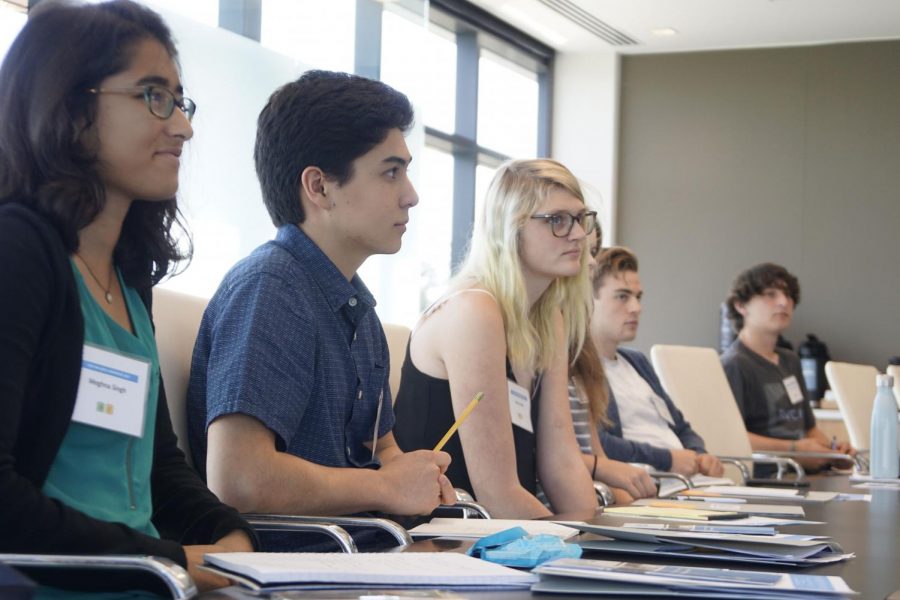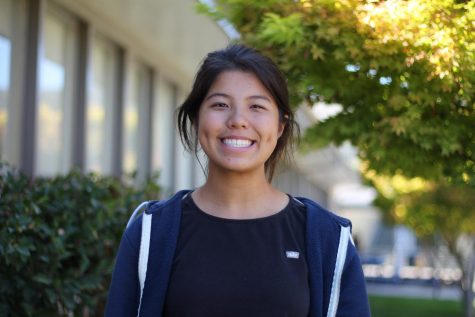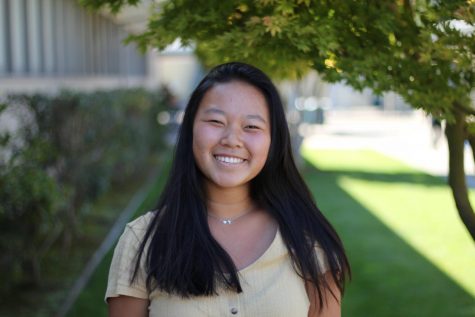TeenzTalk Hosts Inaugural Wellness Conference
Attendees at TeenzTalk’s Teen Wellness Conference watch a talk by Chloe Sorensen and Annabelle Gardner titled “Storytelling for Change.” At the conference, most teens were present to watch others’ presentations — but many, including Walter Li (center,) doubled as speakers and panelists.
October 25, 2017
TeenzTalk, an organization founded by senior Nadia Ghaffari, hosted its first annual Teen Wellness Conference at the Microsoft campus in Mountain View on Saturday, September 30. Around 200 teenagers from around the Bay Area attended to be more informed about mental health and to learn ways to improve their own mental wellness.
TeenzTalk wanted the conference to create a safe space for teenagers to discuss their experiences with mental health and learn about resources they can access when they need support.
Speakers Natalie Hampton and Ruby Spies kicked off the conference with personal stories about mental wellness. Natalie, the creator of the app Sit With Us, told her story of being bullied and explained how her experience with bullying inspired her to create her app. Ruby presented her perspective on the stigmas surrounding mental health as a queer female with mental illness. After each speaker finished their talks, the audience asked Natalie and Ruby questions about their experiences and for advice about their own problems.
Teenagers at the conference said having peers their own age speak rather than adults made it much easier to relate to the talks. Ashley Reina, a senior at Middle College, said she thought the conference’s choice to have teen speakers made their messages more resonant.
“They did a good job of creating a dialogue that was very easy for kids [to understand by] not using really big terms and inviting speakers that were youth made it easier to relate to,” Ashley said.
After the speeches, the participants split off into breakout sessions. With 17 options, participants had topics ranging from “Lights, Camera, Action: Today’s Mental Health on Screens” to “Discovering Yourself with SoulCollage®,” a primer for a program that uses collages to aid in self-discovery. While the breakouts each had different ways of approaching mental health, they all focused on improving mental wellness for teenagers and erasing the stigma surrounding the topic of mental health.
After their breakouts ended, participants perused the resource tables, which provided information about mental health resources for teenagers. Tables at the Teen Wellness Conference included The Bay Area’s Children Association, Strong 365 and TeenzTalk’s partners: the Stanford Center for Youth Mental Health and Wellbeing and the Children’s Health Council. This exploration period also gave everyone a chance to talk with others and form new connections.
For Athenian High School sophomore Zainab, the time dedicated to exploring resources and connecting to peers fulfilled the main reasons she had for going to the conference — to obtain information and connect with organizations and other high schoolers.
“I hoped to learn other resources I could get to start my own stuff, and I did,” Zainab said. “I connected to other organizations that were interested in having branches at my school, and I met other people who were passionate [about mental health].”
The conference concluded with panel discussions, which featured a variety of perspectives, from Stanford professors to high school students. The panels answered questions participants had about mental health, hoping to allow everyone to ask for advice without any shame or fear of judgement.
“I thought the panel was really cool because it’s like getting advice on hard topics that aren’t easy to navigate,” Zainab said. “So hearing professionals and other fellow high schoolers with experiences and advice is really helpful.”
Like Zainab, Presentation High School sophomore Sarah Ungerer hopes to bring the information she learned at the conference back to her school to benefit her classmates.
“I just want to be educated on a lot of the different topics,” Sarah said. “I want to bring what I learn back to my school so that they’re able to have that same experience in a different way.”
After the success of the inaugural Teen Wellness Conference, Nadia hopes the conference will expand even after she graduates. TeenzTalk plans to implement smaller, more frequent workshops throughout the year for teenagers to discuss current events or personal problems.
“We want to create a safe space for young people to talk about mental health and current events and how to stay well in the face of difficulty and adversity on a regular basis,” Nadia said.





